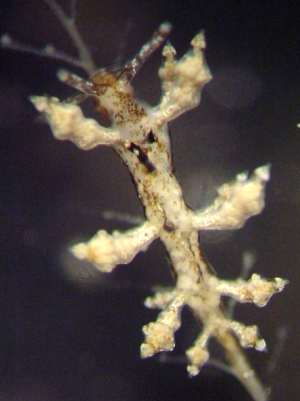
Eubranchus prietoi
Llera & Ortea, 1981
Order: NUDIBRANCHIA
Suborder: AEOLIDINA
Superfamily: AEOLIDINA
Family: Eubranchidae
DISTRIBUTION
Known from Atlantic coast from Arcachon, France to Dakar, Senegal.
PHOTO
'Saint Yves', Arcachon, Arcachon Basin. France. Atlantic Ocean. Depth: 9 -12 m. Length: 2 - 7 mm 20 June 2005. rocks with hydroids. Photographer: Marina Poddubetskaia Ossokine
This small eubranchid has a translucent body with scattered off-white, and brownish spots and patches. The cerata are transparent with off-white spotting, and the yellowish brown digestive gland shows through the ceratal wall. The cerata are arranged in 4 or 5 single rows down each side, with only one row in front of the heart. Llera and Ortea (1981) describe the anterior 2 rows on each side having a double row at the base of these anterior groups, but this is not evident in Marina Poddubetskaia's photos. The cerata often have three swellings, a small apical one, a large median one and a smaller basal one. There appears to be small whitish tubercles forming a ring around each swelling. There is often a darkish band below the uppermost swelling but this may just be because the ceratal wall at this point is transparent. The smooth rhinophores are transparent with whitish spotting and two translucent brown bands, one near the tip and one near the base.
This species differs from other European species in having only a single ceratal row in front of the heart. Because of this, the dark brown precardiac digestive gland duct is very obvious through the dorsal body wall as a dark brown V-shaped mark. Llera & Ortea (1981) report Eubranchus prietoi feeding on Plumularia setacea. Marina Poddubetskaia confirms this and reports seeing it on other hydroids as well. It is quite quite similar to in general appearance to Eubranchus doriae and Eubranchus exiguus, but it can be easily distinguished by the dark, Y-shaped, digestive gland duct visible through the body wall. Poddubetskaia also notes its similarity to Tergipes tergipes, but as she notes, in that species the cerata on each side are arranged in alternate rows rather than opposite each other. E. prietoi grows to about 7 mm in length.
-
Edmunds, M, & Kress, A. (1969) On the European species of Eubranchus (Mollusca Opisthobranchia). Journal of the Marine Biological Association, United Kingdom, 49(4): 879-912, Pls.1-2.
-
Llera, E. M. and Ortea, J. A. (1981) Una nueva especie de Eubranchus (Mollusca: Nudibranchiata) del Norte de España. Bollettino Malacologico, 17: 265-270.
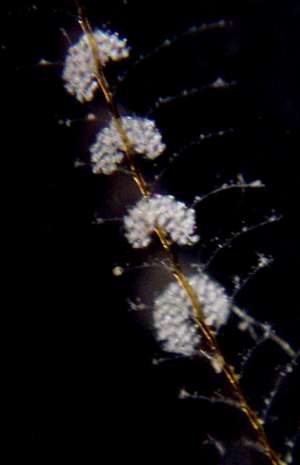
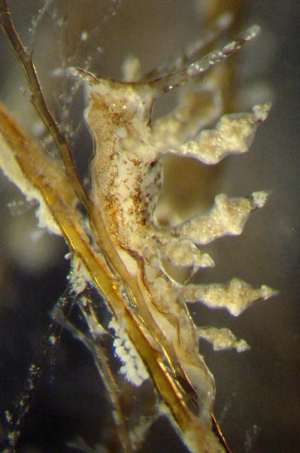
Rudman, W.B., 2005 (August 26) Eubranchus prietoi Llera & Ortea, 1981. [In] Sea Slug Forum. Australian Museum, Sydney. Available from http://www.seaslugforum.net/find/eubrprie
Related messages
Eubranchus prietoi from the French Mediterranean
August 10, 2006
From: Marina Poddubetskaia Ossokine
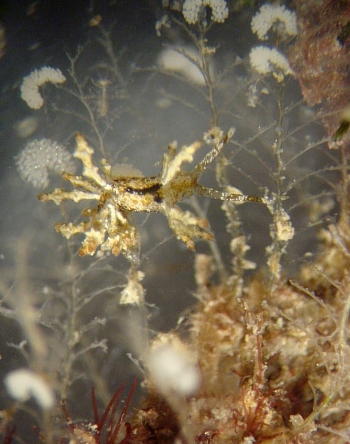
Dear Bill,
When I sent you my last message about Eubranchus prietoi from Arcachon Basin and Senegal, you said it was an 'unknown species which have been described and seldom seen again.'
That's funny since I meet this species everywhere I go. Last week I found it on the Mediterranean coast of France. And it is very common in Arcachon now too.
Locality: 'La digue', Port-Leucate , 3m, France, Mediterranean, 24 June 2006. Length: animal : 6mm / eggs : 2mm . Photographer: Marina Poddubetskaia Ossokine.
So, now we can extend the distribution of E. prietoi to the Mediterranean.
Also, please note that this animal and eggs were found on an hydroid different from Plumularia setacea, but similar to the food of Senegalese specimens.
Best wishes,
Marina.
Nembro website
nembro@nembro.info
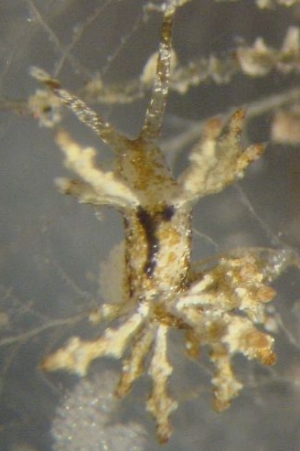
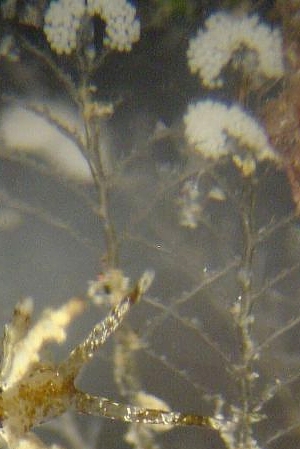
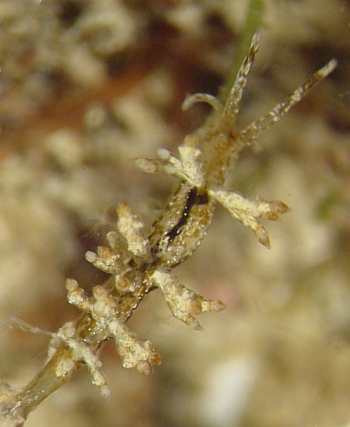
Dear Marina,
Thanks for the record. The dark brown Y-shaped digestive gland duct, and the single row of cerata in front of the heart, certainly characterise this species.
I am glad you are in the position to bring an 'unknown' species into the spotlight. There are many abundant species out there which we know nothing about. Hopefully the Forum will give all those eager 'eyes' out there the opportunity to increase our knowledge of many of them.
Best wishes,
Bill Rudman
Eubranchus prietoi from French Atlantic
August 27, 2005
From: Marina Poddubetskaia Ossokine

Dear Bill,
Here is a new species for the Forum - Eubranchus prietoi. It is very common in Arcachon Basin and many specimens could be seen from October to July on Plumularia setacea.
Locality: 'Saint Yves', Arcachon, Arcachon Basin. France. Atlantic Ocean. Depth: 9 -12 m. Length: 2 - 7 mm 20 June 2005. rocks with hydroids. Photographer: Marina Poddubetskaia Ossokine
Also, I saw this species in Dakar (Senegal) some months ago, but on a different hydroid. And thank you to Lucas Cervera who, some months ago, firstly identified this species for me and provided me with original description.
For more information, please have a look at my page :
http://www.nembro.info/Nudibranchia/uk_eubranchus_prietoi.html.
Best wishes,
Marina.
Photos: Marina Poddubetskaia - Nembro website
nembro@nembro.info


Thanks Marina,
Always pleased to see one of these unknown species which have been described and seldom seen again.
Best wishes,
Bill Rudman
